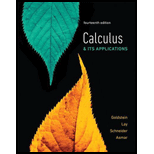Problem 1CYU: Consider the function h(x)=(2x35)5+(2x35)4 Write h(x) as a composition function, f(g(x)). Problem 2CYU: Consider the function h(x)=(2x35)5+(2x35)4 Compute f(x) and f(g(x)). Problem 3CYU Problem 1E: Compute f(g(x)), where f(x) and g(x) are the following: f(x)=xx+1,g(x)=x3 Problem 2E: Compute f(g(x)), where f(x) and g(x) are the following: f(x)=x1,g(x)=1x+1 Problem 3E: Compute f(g(x)), where f(x) and g(x) are the following: f(x)=x(x2+1),g(x)=x Problem 4E: Compute f(g(x)), where f(x) and g(x) are the following: f(x)=x+1x3,g(x)=x+3 Problem 5E: Each of following functions may be viewed as a composite function h(x)=f(g(x)). Find f(x) and g(x).... Problem 6E: Each of following functions may be viewed as a composite function h(x)=f(g(x)). Find f(x) and g(x).... Problem 7E: Each of following functions may be viewed as a composite function h(x)=f(g(x)). Find f(x) and g(x).... Problem 8E: Each of following functions may be viewed as a composite function h(x)=f(g(x)). Find f(x) and g(x).... Problem 9E: Each of following functions may be viewed as a composite function h(x)=f(g(x)). Find f(x) and g(x).... Problem 10E: Each of following functions may be viewed as a composite function h(x)=f(g(x)). Find f(x) and g(x).... Problem 11E: Differentiate the functions in Exercises 1120 using one or more of the differentiation rules... Problem 12E: Differentiate the functions in Exercises 1120 using one or more of the differentiation rules... Problem 13E: Differentiate the functions in Exercises 1120 using one or more of the differentiation rules... Problem 14E: Differentiate the functions in Exercises 1120 using one or more of the differentiation rules... Problem 15E: Differentiate the functions in Exercises 1120 using one or more of the differentiation rules... Problem 16E: Differentiate the functions in Exercises 1120 using one or more of the differentiation rules... Problem 17E: Differentiate the functions in Exercises 1120 using one or more of the differentiation rules... Problem 18E: Differentiate the functions in Exercises 1120 using one or more of the differentiation rules... Problem 19E: Differentiate the functions in Exercises 1120 using one or more of the differentiation rules... Problem 20E: Differentiate the functions in Exercises 1120 using one or more of the differentiation rules... Problem 21E: In Exercises 2126, a function h(x) is defined in terms of a differentiable f(x). Find an expression... Problem 22E Problem 23E Problem 24E: In Exercises 2126, a function h(x) is defined in terms of a differentiable f(x). Find an expression... Problem 25E: In Exercises 2126, a function h(x) is defined in terms of a differentiable f(x). Find an expression... Problem 26E Problem 27E: Sketch the graph of y=4x/(x+1)2,x1. Problem 28E: Sketch the graph of y=2/(1+x2) Problem 29E: Compute ddxf(g(x)), where f(x) and g(x) are following: f(x)=x5,g(x)=6x1 Problem 30E: Compute ddxf(g(x)), where f(x) and g(x) are following: f(x)=x,g(x)=x2+1 Problem 31E: Compute ddxf(g(x)), where f(x) and g(x) are following: f(x)=1x,g(x)=1x2 Problem 32E: Compute ddxf(g(x)), where f(x) and g(x) are following: f(x)=11+x,g(x)=1x Problem 33E: Compute ddxf(g(x)), where f(x) and g(x) are following: f(x)=x4x2,g(x)=x24 Problem 34E: Compute ddxf(g(x)), where f(x) and g(x) are following: f(x)=4x+x2,g(x)=1x4 Problem 35E: Compute ddxf(g(x)), where f(x) and g(x) are following: f(x)=(x3+1)2,g(x)=x2+5 Problem 36E: Compute ddxf(g(x)), where f(x) and g(x) are following: f(x)=x(x2)4,g(x)=x3 Problem 37E: Compute dydx using the chain rule in formula (1). State your answer in terms of x only y=u3/2,u=4x+1... Problem 38E: Compute dydx using the chain rule in formula (1). State your answer in terms of x only y=u2+2u,u=xx2... Problem 39E: Compute dydx using the chain rule in formula (1). State your answer in terms of x only... Problem 41E: Compute dydxt=t0 y=x23x,x=t2+3,t0=0 Problem 42E: Compute dydxt=t0 y=(x22x+4)2,x=1t+1,t0=1 Problem 43E: Compute dydxt=t0 y=x+1x1,x=t24,t0=3 Problem 44E Problem 45E: Find the equation of the line tangent to the graph of y=2x(x4)6 at the point (5,10). Problem 46E: Find the equation of the line tangent to the graph of y=x2x2 at the point (1,1). Problem 47E: Find the x- coordinate of all points on the curve y=(x2+4x3)3 with horizontal tangent line. Problem 48E: The function f(x)=x26x+10 has one relative minimum point for x0. Find it. Problem 49E Problem 50E: Allometric Equation Many relations in biology are expressed by power functions, known as allometric... Problem 51E: Suppose that P, y and t are variables, where P is a function of y an y is a function of t. Write the... Problem 52E: Suppose that Q, x and y are variables, where Q is a function of x and x is a function of y. (Read... Problem 53E: Marginal Profit and Times Rate of Change When a company produces and sells x thousands units per... Problem 54E: Marginal Cost and Time Rate of Change The cost of manufacturing x cases of cereal is C dollars,... Problem 55E: A model for Carbon Monoxide Levels Ecologists estimate that, when the population of a certain city... Problem 56E: Profit A manufacturer of microcomputers estimates that t months from now it will sell x thousand... Problem 57E Problem 58E Problem 59E: If f(x) and g(x) are differentiable functions, such that f(1)=2, f(1)=3, f(5)=4, g(1)=5, g(1)=6,... Problem 60E Problem 61E: Effect of Stocks on Total Assets of a Company After a computer software company went public, the... Problem 62E: Refer to Exercise 61. Use chain rule to find dWdt|t=1.5 and dWdt|t=3.5. Give the interpretation for... Problem 63E: Refer to Exercise 61. Find dxdt|t=2.5 and dxdt|t=4. Give an interpretation for these values. Use... Problem 64E: Refer to Exercise 61. What was the maximum value of the company during the first 6 months since it... Problem 65E: In an expression of the form f(g(x)), f(x) is called the outer function and g(x) is called the inner... format_list_bulleted


 Trigonometry (MindTap Course List)TrigonometryISBN:9781337278461Author:Ron LarsonPublisher:Cengage Learning
Trigonometry (MindTap Course List)TrigonometryISBN:9781337278461Author:Ron LarsonPublisher:Cengage Learning College AlgebraAlgebraISBN:9781305115545Author:James Stewart, Lothar Redlin, Saleem WatsonPublisher:Cengage Learning
College AlgebraAlgebraISBN:9781305115545Author:James Stewart, Lothar Redlin, Saleem WatsonPublisher:Cengage Learning


